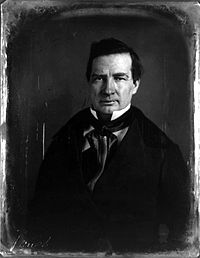Thomas Rusk
| Thomas Jefferson Rusk | |
|---|---|
 |
|
| President pro tempore of the United States Senate |
|
|
In office March 14, 1857 – July 29, 1857 |
|
| Preceded by | James M. Mason |
| Succeeded by | Benjamin Fitzpatrick |
|
United States Senator from Texas |
|
|
In office February 21, 1846 – July 29, 1857 |
|
| Preceded by | (none) |
| Succeeded by | James P. Henderson |
| Member of the Republic of Texas House of Representatives from Nacogdoches County | |
|
In office 1837–1838 |
|
| Preceded by | John Kirby Allen |
| Succeeded by | David S. Kaufman |
| 1st Texas Secretary of War | |
|
In office March 17, 1836 – November 13, 1837 |
|
| Preceded by | Position established |
| Succeeded by | William S. Fisher |
| Personal details | |
| Born |
December 5, 1803 Pendleton, South Carolina, US |
| Died | July 29, 1857 (aged 53) Nacogdoches, Texas, US |
| Spouse(s) | Mary Frances "Polly" Cleveland Rusk |
| Profession | Politician, Lawyer, Judge |
Thomas Jefferson Rusk (December 5, 1803 – July 29, 1857) was an early political and military leader of the Republic of Texas, serving as its first Secretary of War as well as a general at the Battle of San Jacinto. He was later a US politician and served as a Senator from Texas from 1846 until his suicide. He served as the President pro tempore of the United States Senate in 1857.
Rusk was born in Pendleton, South Carolina, to John Rusk, a stonemason, and Mary Sterritt Rusk. After being admitted to the bar in 1825, Rusk began his law practice in Clarkesville, Georgia. In 1827, he married Mary F. (Polly) Cleveland, the daughter of general John Cleveland. Rusk became a business partner of his father-in-law after the marriage. He lived in the gold region of Georgia and made sizable mining investments. In 1834, however, the managers of the company in which he had invested embezzled all the funds and fled to Mexican Texas. Rusk pursued them to Nacogdoches, but never recovered the money.
Rusk decided to stay in Texas and became a citizen of Mexico in 1835, applied for a headright in David G. Burnet's colony, and sent for his family. After hearing Nacogdoches citizens denounce the despotism of Mexico, Rusk became involved in the independence movement. He organized volunteers from Nacogdoches and hastened to Gonzales, where his men joined Stephen F. Austin's army in preventing the Mexicans from seizing their cannon. They proceeded to San Antonio, but Rusk left the army before the Siege of Bexar.
...
Wikipedia
